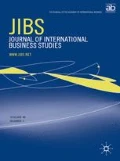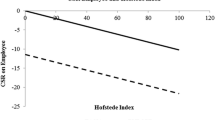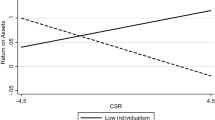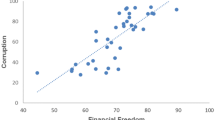Abstract
Studies of international differences in firm behavior tend to consider either institutional or cultural factors. Focusing on corporate social responsibility (CSR), we conjecture that not only both institutions and culture need to be taken into account, but also the interaction between these two sets of factors. We theorize that the institutions associated with economic freedom in combination with the cultural trait long-term orientation positively influences CSR practices. Panel data of 5023 companies from 41 countries confirm this expectation. This finding pertains both to long-term orientation at the level of the society and at the level of the company. Our findings support calls for more attention to interactive effects of cultures and institutions.
Résumé
Les études sur les différences internationales au niveau du comportement des firmes tendent à considérer les facteurs institutionnels ou culturels. En nous concentrant sur la responsabilité sociale des entreprises (RSE), nous supposons que non seulement les institutions et la culture doivent être prises en compte, mais qu’il faut également s’intéresser aux interactions entre ces deux ensembles de facteurs. Nous faisons l’hypothèse que les institutions associées à la liberté économique, en combinaison avec le trait culturel de l’orientation à long terme, influencent positivement les pratiques de RSE. Les données d’un panel de 5 023 entreprises de 41 pays confirment cette hypothèse. Ce résultat concerne à la fois l’orientation à long terme au niveau de la société et au niveau de l’entreprise. Nos résultats soutiennent les appels pour une plus grande attention aux effets interactifs des cultures et des institutions.
Resumen
Los estudios sobre las diferencias internacionales en comportamiento empresarial tienden a considerar factores institucionales o culturales. Enfocándonos en la responsabilidad social empresarial (RSE) conjeturamos que no solo las instituciones y la cultura deben tener en cuenta, pero también la interacción entre estos dos conjuntos de factores. Teorizamos que las instituciones asociadas a la libertad económica en combinación con el atributo cultural a largo plazo influencia positivamente las prácticas de RSE. Los datos de panel de 5.023 empresas de 41 países confirman esta expectativa. Este hallazgo se refiere tanto a la orientación de largo plazo a nivel de la sociedad y al nivel de la empresa. Nuestros hallazgos respaldan los llamados a prestar más atención a los efectos interactivos entre las culturas y las instituciones.
Resumo
Estudos sobre diferenças internacionais no comportamento de empresas tendem a considerar fatores institucionais ou culturais. Focando na responsabilidade social corporativa (CSR), conjecturamos que não apenas instituições e cultura precisam ser levadas em consideração, mas também a interação entre esses dois conjuntos de fatores. Teorizamos que instituições associadas à liberdade econômica em combinação com a orientação cultural de longo prazo influenciam positivamente práticas de CSR. Dados em painel de 5.023 empresas de 41 países confirmam essa expectativa. Essa constatação refere-se tanto à orientação de longo prazo no nível da sociedade como no nível da empresa. Nossas descobertas confirmam recomendações de mais atenção aos efeitos interativos de culturas e instituições.
摘要
对公司行为的国际差异的研究倾向于考虑制度或文化因素。瞄准企业社会责任(CSR), 我们推测不仅需要同时考虑制度和文化, 而且还要考虑这两组因素之间的互动。我们认为, 与经济自由相关联的制度与长期导向的文化特征相结合对CSR实践产生积极影响。来自41个国家的5,023家公司的面板数据证实了这一预期。 这一发现同时涉及社会层面和公司层面的长期导向。我们的发现支持要更多关注文化与制度的互动影响的呼吁。


Similar content being viewed by others
REFERENCES
Aguilera, R. V., Rupp, D. E., Williams, C. A., & Ganapathi J. 2007. Putting the S back in corporate social responsibility: A multilevel theory of social change in organizations, Academy of Management Review, 32(3): 836–863.
Banalieva, E. R., Cuervo-Cazurra, A., & Sarathy, R. 2018. Dynamics of pro-market institutions and firm performance. Journal of International Business Studies, 49(7): 858–880.
Bell, K. 2015. Can the capitalist economic system deliver environmental justice? Environmental Research Letters, 10: 125017.
Bénabou, R., & Tirole, J. 2010. Individual and corporate social responsibility. Economica, 77(305): 1–19.
Chinese Culture Connection. 1987. Chinese values and the search for culture-free dimensions of culture. Journal of Cross-Cultural Psychology, 18(2): 143–164.
Davis, L.E., North, D.C. 1971. Institutional change and American economic growth, Cambridge University Press, Cambridge, UK
Durach, C. F., & Wiengarten, F. 2017. Environmental management: The impact of national and organisational long-term orientation on plants’ environmental practices and performance efficacy. Journal of Cleaner Production, 167: 749–758.
El Ghoul, S., Guedhami, O., & Kim, Y. 2017. Country-level institutions, firm value, and the role of corporate social responsibility initiatives. Journal of International Business Studies, 48(3): 360–385.
Fainshmidt, S., Judge, W. Q., Aguilera, R. V., & Smith, A. 2018. Varieties of institutional systems: A contextual taxonomy of understudied countries. Journal of World Business, 53(3): 307–322.
Fu, P. P., Kennedy, J., Tata, J., Yukl, G., Bond, et al. 2004. The impact of societal cultural values and individual social beliefs on the perceived effectiveness of managerial influence strategies: A meso approach. Journal of International Business Studies, 35(4): 284–305.
Gallego-Álvareza, I., & Ortas, E. 2017. Corporate environmental sustainability reporting in the context of national cultures: A quantile regression approach. International Business Review, 26: 337–353.
Graafland, J., & Noorderhaven, N. 2018. National culture and environmental responsibility research revisited. International Business Review, 27(5): 958–968.
Gwartney, J. 2009. Institutions, economic freedom, and cross-country differences in performance. Southern Economic Journal, 75(4): 937.
Hartmann, J., & Uhlenbruck, K. 2015. National institutional antecedents to corporate environmental performance. Journal of World Business, 50: 729–741.
Hofstede, G. 2001. Culture’s consequences. Second edition. Thousand Oaks, CA: Sage Publications.
Hofstede, G., & Minkov, M. 2010. Long-versus short-term orientation: new perspectives. Asia Pacific Business Review, 16(4): 493–504.
Ingram, P., & Clay, K. 2000. The choice-within-constraints new institutionalism and implications for sociology. Annual Review of Sociology, 26(1): 525–546.
Ioannou, I., & Serafeim, G. 2012. What drives corporate social performance & quest: The role of nation-level institutions. Journal of International Business Studies, 43(9): 834–864.
Jackson, G., & Apostolakou, A. 2010. Corporate social responsibility in Western Europe: An institutional mirror or substitute? Journal of Business Ethics, 94: 371–394.
Jackson, G., & Deeg, R. 2008. Comparing capitalisms: Understanding institutional diversity and its implications for international business. Journal of International Business Studies, 39(4): 540–561.
Kinderman, D. 2012. Free us up so I can be responsible: The co-evolution of corporate social responsibility and neo-liberalism in the UK, 1977–2010. Socio-Economic Review, 10(1): 29–57.
King, B. G. 2008. A political mediation model of corporate response to social movement activism. Administrative Science Quarterly, 53: 395–421.
Kitzmueller, M., & Shimshack, J. 2012. Economic perspectives on corporate social responsibility. Journal of Economic Literature, 50(1): 51–84.
Lewellyn, K. B. 2014. A cross-national investigation of IPO activity: The role of formal institutions and national culture. International Business Review, 23(6): 1167–1178.
Li, Y., & Zahra, S. A. 2012. Formal institutions, culture, and venture capital activity: A cross-country analysis. Journal of Business Venturing, 27(1): 95–111.
Linnenluecke, M. K., & Griffiths, A. 2010. Corporate sustainability and organizational culture. Journal of World Business, 45: 357–366.
Minkov, M., & Hofstede, G. 2012. Hofstede’s fifth dimension: New evidence from the World Values Survey. Journal of Cross-Cultural Psychology, 43(1): 3–14.
Miska, C., Szőcs, I., & Schiffinger, M. 2018. Culture’s effects on corporate sustainability practices: A multi-domain and multi-level view. Journal of World Business, 53(2): 263–279.
Peng, Y.-S., Dashdeleg, A.-U., & Chih, H.L. 2014. National culture and firm’s CSR engagement: A cross-nation study. Journal of Marketing and Management, 5(1): 38–49.
Peterson, M. F., Arregle, J. L., & Martin, X. 2012. Multilevel models in international business research. Journal of International Business Studies, 43(5): 451–457.
Peterson, M. F. & Barreto, T. S. 2018. Interpreting societal culture value dimensions. Journal of International Business Studies, 49(9): 1190–1207.
Rehbein, K., Logsdon, J. M. & Van Buren III, H. J. 2013. Corporate responses to shareholder activists: Considering the dialogue alternative. Journal of Business Ethics, 112: 137–154.
Short, J. C., Ketchen, D. J., Bennet, N., & du Toit, M. 2006. An examination of firm, industry, and time effects on performance using random coefficients modeling. Organizational Research Methods, 9(3): 259–284.
Slawinski, N., & Bansal, P. 2009. Short on time: The role of time in business sustainability. Academy of Management Proceedings. Briarcliff Manor, NY: Academy of Management.
Souder, D., & Bromiley, P. 2012. Explaining temporal orientation: Evidence from the durability of firms’ capital investments. Strategic Management Journal, 33: 550–569.
Venaik, S., Zhu, Y., & Brewer, P. 2013. Looking into the future: Hofstede long term orientation versus GLOBE future orientation. Cross Cultural Management: An International Journal, 20(3): 361–385.
Young, S. L., & Makhija, M. V. 2014. Firms’ corporate social responsibility behavior: An integration of institutional and profit maximization approaches. Journal of International Business Studies, 45(6): 670–698.
ACKNOWLEDGEMENTS
This work was supported by the Templeton World Charity Foundation, Inc. Templeton World Charity Foundation had no involvement in the study design; collection, analysis and interpretation of data; in the writing of the report; and in the decision to submit the article for publication.
Author information
Authors and Affiliations
Corresponding author
Additional information
Publisher's Note
Springer Nature remains neutral with regard to jurisdictional claims in published maps and institutional affiliations.
Accepted by Mark F. Peterson, Area Editor, 25 November 2019. This article has been with the authors for five revisions.
Rights and permissions
About this article
Cite this article
Graafland, J., Noorderhaven, N. Culture and institutions: How economic freedom and long-term orientation interactively influence corporate social responsibility. J Int Bus Stud 51, 1034–1043 (2020). https://doi.org/10.1057/s41267-019-00301-0
Received:
Revised:
Accepted:
Published:
Issue Date:
DOI: https://doi.org/10.1057/s41267-019-00301-0




